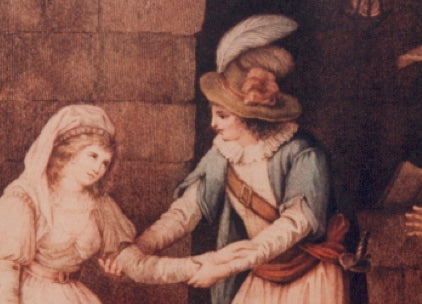
Shakespeare history mystery answer: Who really wrote the plays?
Ian LamontFor the latest edition of the EasyGenie history mystery, I posed a simple question: Who wrote William Shakespeare's plays? A few of you responded after conducting your own research (thank you for the submissions!).
Today, I provide an answer. Or, what I believe to be the correct answer, with the caveat that it may be proven wrong as new evidence comes to light. Anyone who has conducted serious genealogy research should understand!

Let's start with an assumption that while William Shakespeare was a real person and was involved with theatre (he had an acting troupe), he did not write most of the plays and poems under his name. The reasons mentioned in the last History Mystery blog post explain why. Additional factors are cited here.
That leads to the question: Why would someone want to use Shakespeare as a "front man"?
Upper-class views of Shakespeare's plays
The answer may surprise you. While the plays and poems are now regarded as timeless classics that represent the pinnacle of late Elizabethan-era storytelling and poetry, this was not always the case. At the time of their writing and first performances (1580s-early 1600s) plays were seen as a low form of performance art, designed for the illiterate masses.
Although some upper class English including royals loved the plays, few would ever admit to writing such lowbrow entertainment. It would be scandalous.

It could also be potentially dangerous. This was an era in which even implied criticism of royalty or certain aristocrats could have negative repercussions, ranging from ostracism to imprisonment ... or worse:
"Pseudonyms were important because a person could be punished for saying things that displeased the authorities. For example, a man with the sadly fitting name of John Stubbs had his hand cut off because he wrote that Queen Elizabeth I was too old to marry."
The idea that a member of high society published under Shakespeare's name took hold more than 150 years ago. Three names are usually cited by passionate supporters:
- Baconians: Sir Francis Bacon
- Marlovians: Christopher Marlowe
- Oxfordians: Edward de Vere, 17th Earl of Oxford
This is not idle quibbling between the different camps. Scholars have delved into the research. Seminars and conferences are crowded with enthusiasts. Authors have written books. The Stratfordians (those who believe Shakespeare was the author) are also passionate about their beliefs.

My take: It was probably Edward de Vere. I talked with a member of the Shakespeare Oxford Fellowship who listed many compelling reasons, including his love of writing, familiarity with court life, and international travel to Italy (the real William Shakespeare never left England).
But the clincher was this detail describing parallels between de Vere and the main characters in Shakespeare's most memorable works:
"He is easily recognizable in the guise of various characters, including Romeo, Bertram in All's Well That Ends Well, Berowne in Love's Labour's Lost, and above all, Hamlet. Oxford, just like Hamlet, was even abducted by pirates while sailing for England and 'set naked' on the shore."
Piecing together someone's life or accomplishments from hundreds of years ago is very difficult. Just as with genealogy research, it's possible to come to a conclusion based on good records and logic ... but then change your mind as new evidence surfaces!







